Sir John Monash, Personal Files Book 14, 6 October - 30 November 1916, Part 7
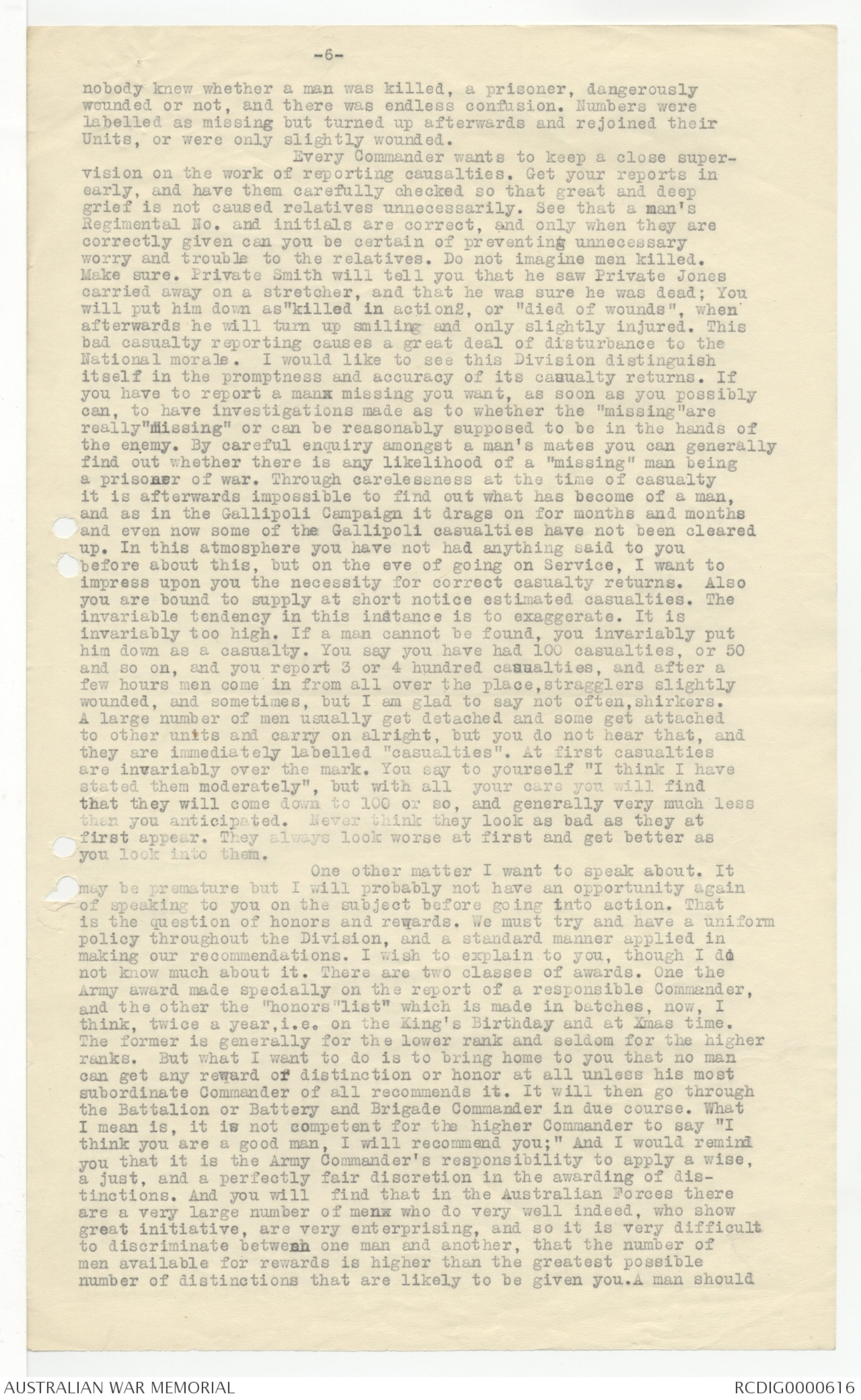
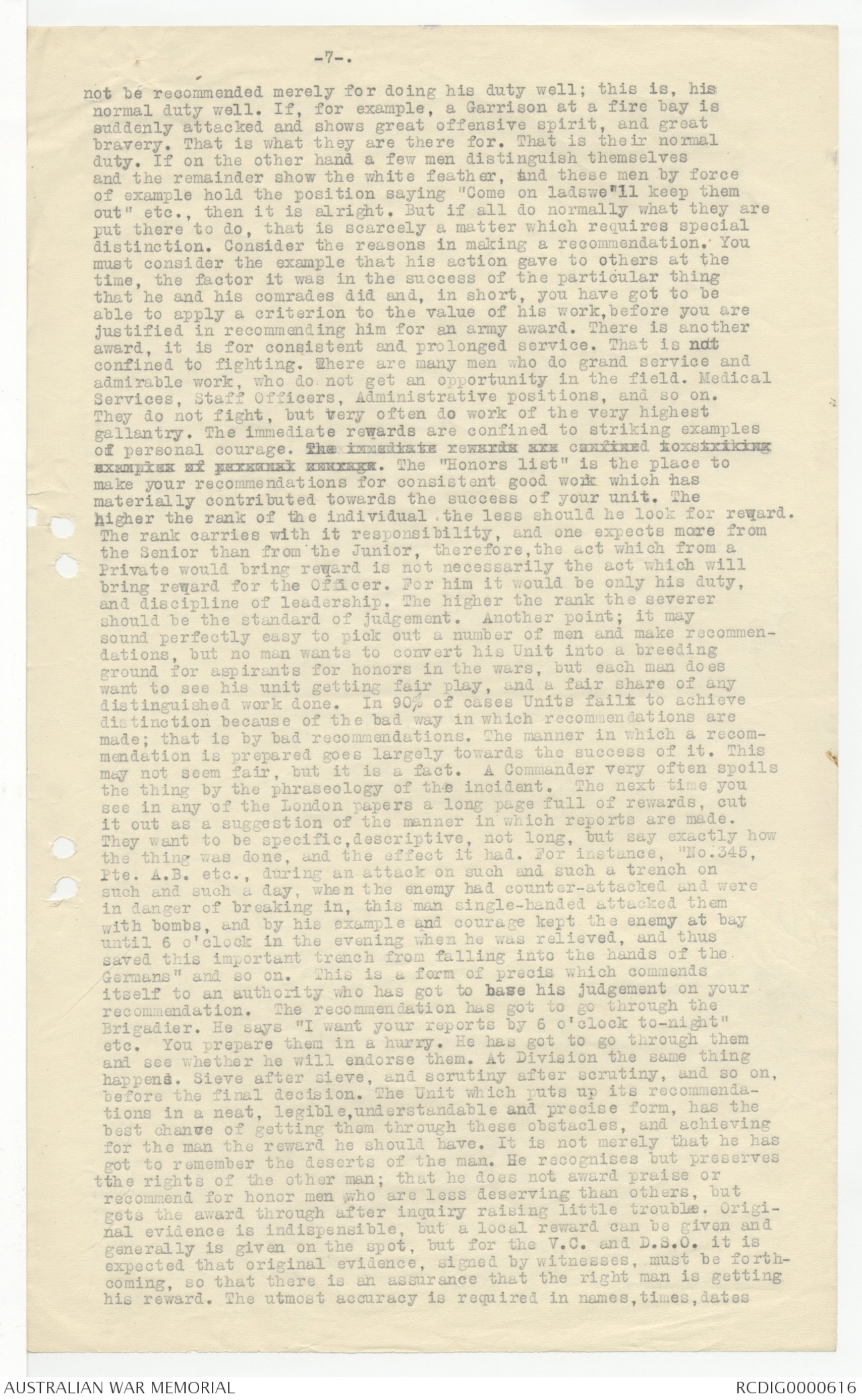
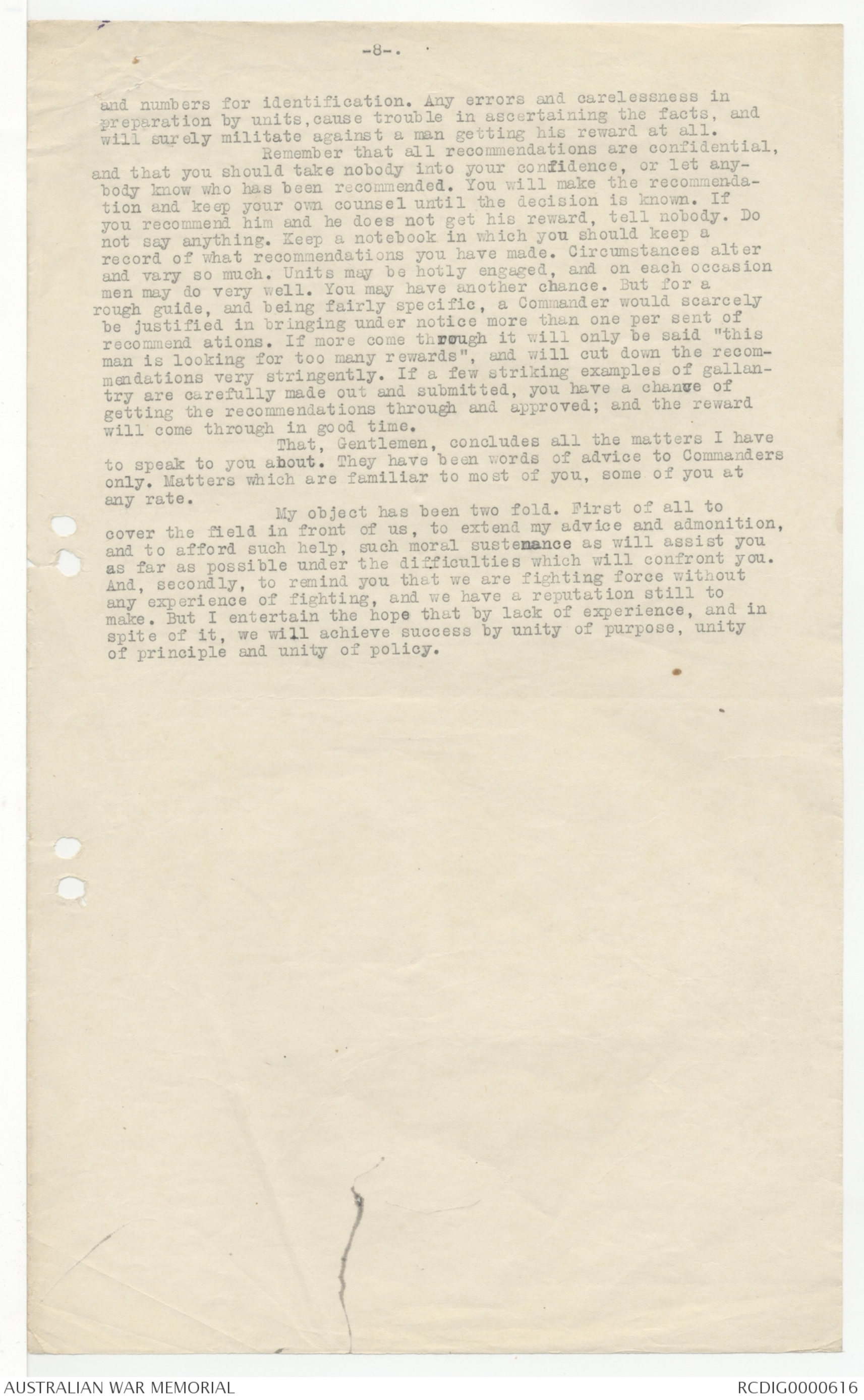
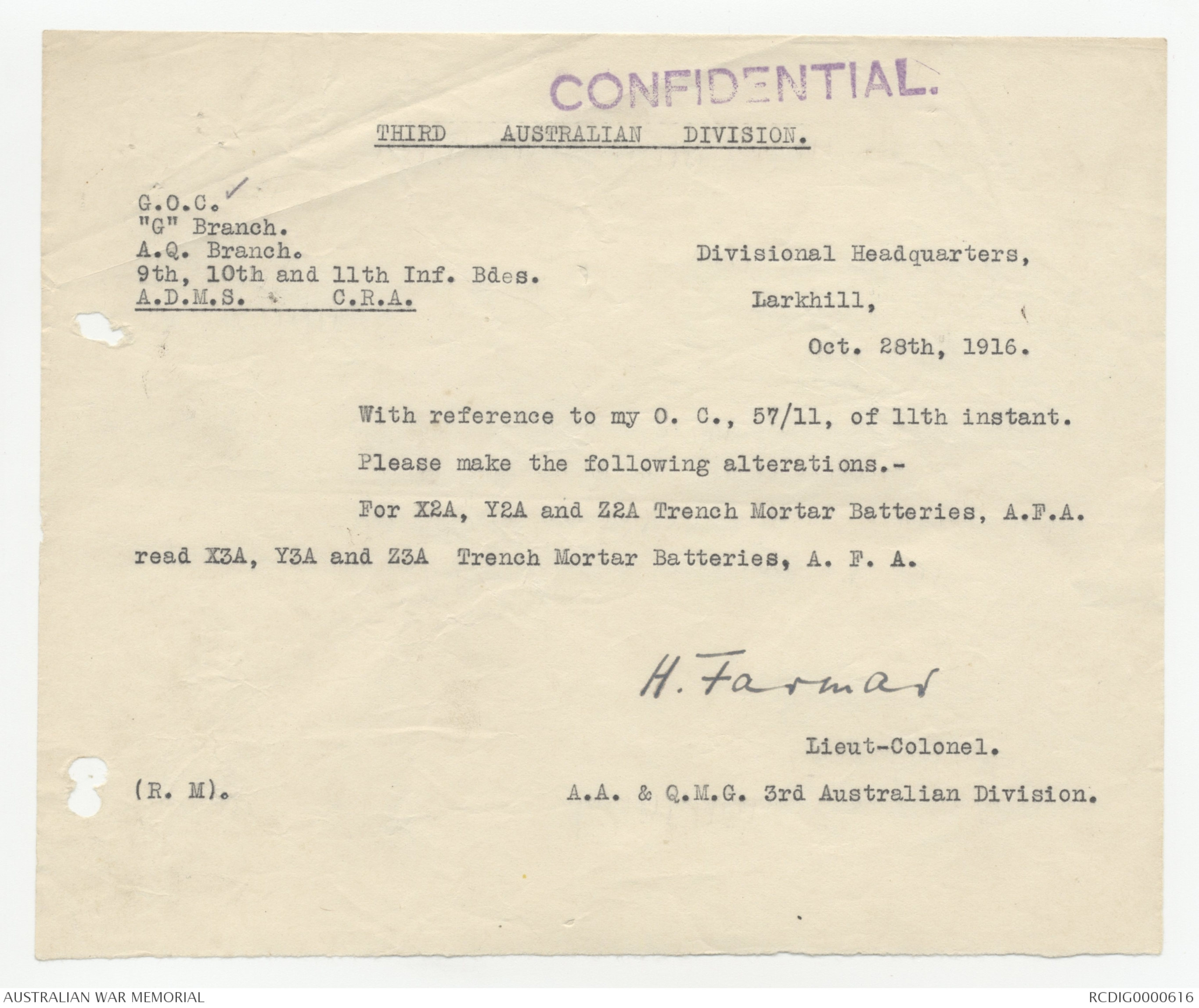
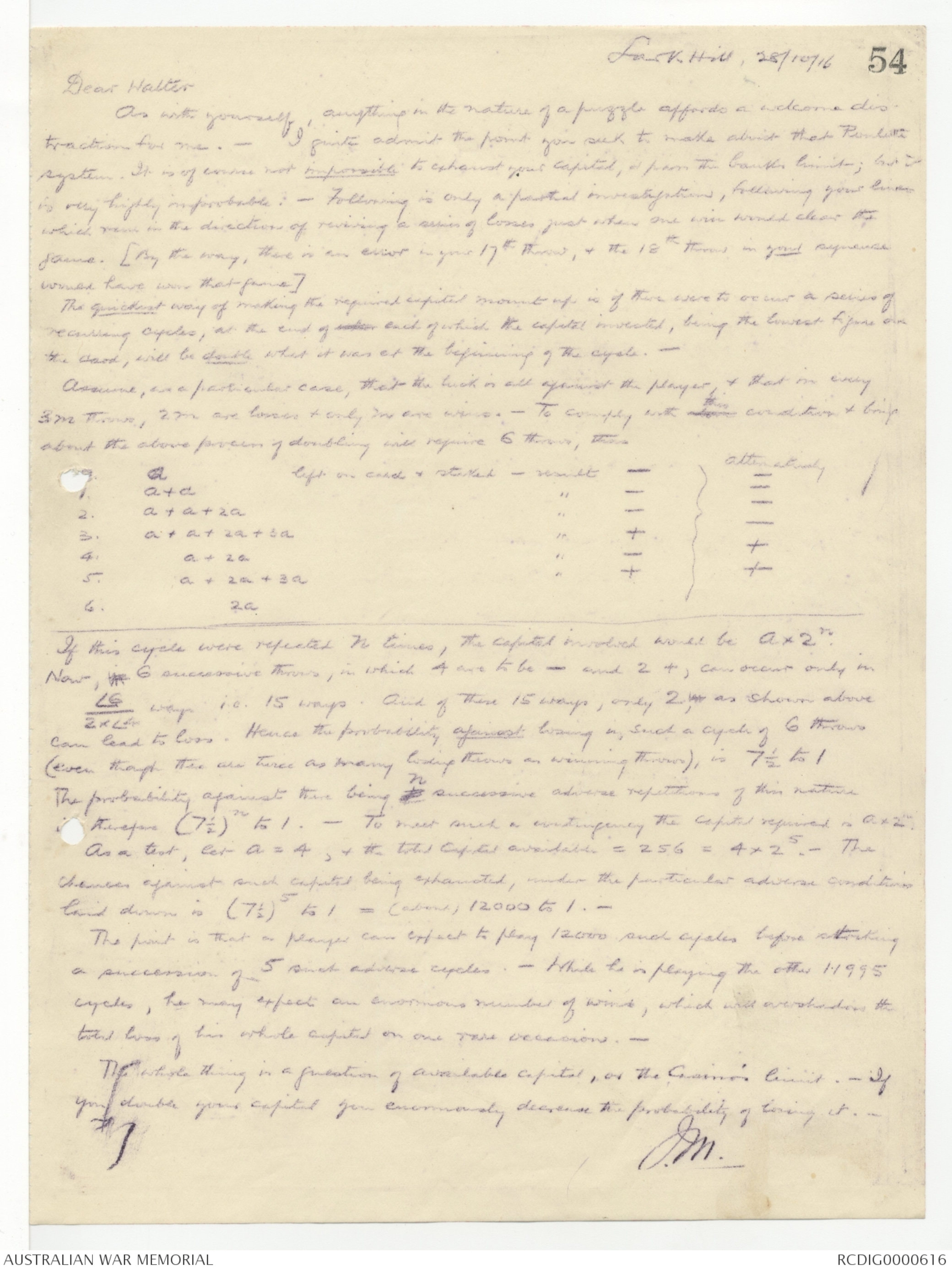
-6-
nobody knew whether a man was killed, a prisoner, dangerously
wounded or not, and there was endless confusion. Numbers were
labelled as missing but turned up afterwards and rejoined their
Units, or were only slightly wounded.
Every Commander wants to keep a close supervision
on the work of reporting casualties. Get your reports in
early, and have them carefully checked so that great and deep
grief is not caused relatives unnecessarily. See that a man's
Regimental No. and initials are correct, and only when they are
correctly given can you be certain of preventing unnecessary
worry and trouble to the relatives. Do not imagine men killed.
Make sure. Private Smith will tell you that he saw Private Jones
carried away on a stretcher, and that he was sure he was dead; You
will put him down as "Killed in action2, or "died of wounds", when
afterwards he will turn up smiling and only slightly injured. This
bad casualty reporting causes a great deal of disturbance to the
National morale. I would like to see this Division distinguish
itself in the promptness and accuracy of its casualty returns. If
you have to report a manx missing you want, as soon as you possibly
can, to have investigations made as to whether the "missing" are
really "missing" or can be reasonably supposed to be in the hands of
the enemy. By careful enquiry amongst a man's mates you can generally
find out whether there's any likelihood of a "missing" man being
a prisoner of war. Through carelessness at the time of casualty
it is afterwards impossible to find out what has become of a man,
and as in the Gallipoli Campaign it drags on for months and months
and even now some of the Gallipoli casualties have not been cleared
up. In this atmosphere you have not had anything said to you
before about this, but on the eve of going on Service, I want to
impress upon you the necessity for correct casualty returns. Also
you are bound to supply at short notice estimated casualties. The
invariable tendency in this instance is to exaggerate. It is
invariably too high. If a man cannot be found, you invariably put
him down as a casualty. You say you have had 100 casualties, or 50
and so on, and you report 3 or 4 hundred casualties, and after a
few hours men come in from all over the place, stragglers slightly
wounded, and sometimes, but I am glad to say not often, shirkers.
A large number of men usually get detached and some get attached
to other units and carry on alright, but you do not hear that, and
they are immediately labelled "casualties". At first casualties
are invariably over the mark. You say to yourself "I think I have
stated them moderately", but with all your care you will find
that they will come down to 100 or so, and generally very much less
than you anticipated. Never think they look as bad as they at
first appear. They always look worse at first and get better as
you look into them.
One other matter I want to speak about. It
may be premature but I will probably not have an opportunity again
of speaking to you on the subject before going into action. That
is the question of honors and rewards. We must try and have a unit
policy throughout the Division, and a standard manner applied in
making our recommendations. I wish to explain to you, though I do
not know much about it. There are two classes of awards. One the
Army award made specially on the report of a responsible Commander
and the other the "honors" list which is made in batches, now, I
think, twice a year, i.e. on the King's Birthday and at Xmas time.
The former is generally for the lower rank and seldom for the high
ranks. But what I want to do is to bring home to you that no man
can get any reward of distinction or honor at all unless his most
subordinate Commander of all recommends it. It will then go though
the Battalion or Battery and Brigade Commander in due course. What
I mean is, it is not competent for the higher Commander to say "I
think you are a good man, I will recommend you;" And I would remind
you that it is the Army Commander's responsibility to supply a wise
a just, and a perfectly fair discretion in the awarding of distinctions.
And you will find that in the Australian Forces there
are a very large number of menx who do very well indeed, who show
great initiative, are very enterprising, and so it is very difficult
to discriminate between one man and another, that the number of
men available for rewards is higher than the greatest possible
number of distinctions that are likey to be given. A man should
-7-
not be recommended merely for doing his duty well, that is, his
normal duty well. If, for example, a Garrison at a fire bay is
suddenly attacked and shows great offensive spirit, and great
bravery. That is what they are there for. That is their normal
duty. If on the other hand a few men distinguish themselves
and the remainder show the white feather, and these men by force
of example hold the position saying "Come on lads we'll keep them
out" etc., then it is alright. But if all do normally what they are
put there to do, that is scarcely a matter which requires special
distinction. Consider the reasons in making a recommendation. You
must consider the example that his action gave to others at the
time, the factor it was in the success of the particular thing
that he and his comrades did and, in short, you have got to be
able to apply a criterion to the value of this work, before you are
justified in recommending him for an army award. There is another
award, it is for consistent and prolonged service. That is not
confined to fighting. There are many men who do grand service and
admirable work, who do not get an opportunity in the field. Medical
Services, Staff Officers, Administrative positions, and so on.
They do not fight, but very often do work of the very highest
gallantry. The immediate rewards are confined to striking examples
of personal courage. The immediate rewards are confined to striking
examples of personal courage. The "Honors list" is the place to
make your recommendations for consistent good work which has
materially contributed towards the success of your unit. The
higher the rank of the individual the less should he look for reward.
The rank carries with it responsibility, and one expects more from
the Senior than the Junior, therefore, the act which from a
Private would bring reward is not necessarily the act which will
bring reward for the Officer. For him it would be only his duty,
and discipline of leadership. The higher the rank the severer
should be the standard of judgement. Another point; it may
sound perfectly easy tom pick out a number of men and make
recommendations, but no man wants to convert his Unit into a breeding
ground for aspirants for honours in the wars, but each man does
want to see his unit getting fair play, and a fair share of any
distinguished word done. In 90% of cases Units failx to achieve
distinction because of the bad way in which recommendations are
made; that is by bad recommendations. The manner in which a recommendation is prepared goes largely towards the success of it. This
may not seem fair, but it is a fact. A Commander very often spoils
the thing by the phraseology of the incident. The next time you
see in any of the London papers a long page full of rewards, cut
it out as a suggestion of the manner in which reports are made.
They want to be specific, descriptive, not long, but say exactly how
the thing was done, and the effect it had. For instance, "No. 345,
Pte. A.B. etc., during an attack on such and such a trench on
such and such a day, when the enemy had counter-attacked and were
in danger of breaking in, this man single-handed attacked them
with bombs, and by his example and courage kept the enemy at bay
until 6 o'clock in the evening when he was relieved, and thus
saved this important trench from falling into the hands of the
Germans" and so on. This is a form of precis which commands
itself to an authority who has got to have his judgement on your
recommendation. The recommendation has got to go through them
and see whether he will endorse them. At Division the same thing
happens. Sieve after sieve, and scrutiny after scrutiny, and so on,
before the final decision. The Unit which puts up its recommendation
in a neat, legible, understandable and precise form, has the
best chance of getting them though these obstacles, and achieving
for the man the reward he should have. It is not merely that he has
got to remember the deserts of the man. He recognises but preserved
the rights of the other man; that he does not award praise or
recommend for honor men who are less deserving than others, but
gets the award through after inquiry raising little trouble. Original
evidence is indispensable, but a local reward can be given and
generally is given on the spot, but for the V.C. and D.S.O. it is
expected that original evidence, signed by witnesses, must be
forthcoming, so that there is an assurance that the right man is getting
his reward. The utmost accuracy is required in names, ties, dates
-8-
and numbers for identification. Any errors and carelessness in
preparation by units, cause trouble in ascertaining the facts, and
will surely militate against a man getting his reward at all.
Remember that all recommendations are confidential,
and that you should take nobody into your confidence, or let anybody
know who has been recommended. You will make the recommendation
and keep your own counsel until the decision is known. If
you recommend him and he does not get a reward, tell nobody. Do
not say anything. Keep a notebook in which you should keep a
record of what recommendations you have made. Circumstances alter
and vary so much. Units may be hotly engaged, and on each occasion
men may do very well. You may have another chance. But for a
rough guide, and being fairly specific, a Commander would scarcely
be justified in bringing under notice more than one per cent of
recommendations. If more come through it will only be said "this
man is looking for too many rewards", and will cut down the recommendations very stringently. If a few striking examples of gallantry
are carefully made out and submitted, you have a chance of
getting the recommendations through and approved; and the reward
will come through in good time.
That, Gentlemen, concludes all the matters I have
to speak to you about. They have been words of advice to Commanders
only. Matters which are familiar to most of you, some of you at
any rate.
My object has been two fold. First of all to
cover the field in front of us, to extend my advice and admonition
and to afford such help, such moral sustenace as will assist you
as far as possible under the difficulties which will confront you.
And, secondly, to remind you that we are fighting force without
any experience of fighting, and we have a reputation still to
make, but I entertain the hope that by lack of experience, and in
spite of it, we will achieve success by unity of purpose, unity
of principle and unity of policy.
CONFIDENTIAL
THIRD AUSTRALIAN DIVISION.
G.O.C.
"G" Branch.
A.Q. Branch.
9th, 10th and 11th Inf. Bdes.
A.D.M.S. C.R.A
Divisional Headquarters,
Larkhill
Oct. 28th, 1916.
With reference to my O.C., 57/11, of 11th instant.
Please make the following alterations.-
For X2A, Y2A and Z2A Trench Mortar Batteries, A.F.A.
read X3A, Y3A and Z3A Trench Mortar Batteries, A.F.A.
H. Farmar
Lieut-Colonel.
A.A. & Q.M.G. 3rd Australian Division
(R.M).
54
Lark Hill
28/10/16
Dear Halter
As with yourself, anything in the nature of a puzzle affords a welcome
distraction for me. I quite admit the point you seek to make about that Roulette
system. It is of course not impossible to exhaust your capital, & pass the Casino's limits, but it is very highly improbable: - Following is only a partial investigation, following your line which ran in the direction of reviving a series of losses, just when one win would clear the game. [By the way, there is an error in your 17th throw, & the 18th throw in your experience would have won that game]
The quickest way of making the required capital mount up is if there were to occur a series of recurring cycles, at the end of which each of which the capital invested, being the lowest figure on the ward, will be double what it was at the beginning of the cycle.-
Assume, as a particular case, that the luck is all against the player, & that in every3M throw, 2M are losses & only 2m are wins. To comply with above ^this condition & bring about the above process of doubling will require 6 throws, thus
|
alternatively |
|||||
| a |
left on card & started - result |
- |
} |
- |
|
| 1. | a + a |
" |
- |
} |
- |
| 2. | a + a + 2a |
" |
- |
} |
- |
| 3. | a + a + 2a + 3a |
" |
|
} |
- |
| 4. | a + 2a |
" |
- |
} |
|
| 5. | a + 2a + 3a |
" |
|
} |
|
| 6. | 2a |
|
If this cycle were repeated 7 times, the capital involved will be a x 2n
Now, xx 6 successive throws, in which 4 are t be - and 2 +, can occur only in
L6/2 x L4 ways i.e. 15 ways. And of these 15 ways, only 2, xx as shown above
can lead to loss. Hence the probability against losing in, such a cycle of 6 throws
(even though there are twice as many losing throws as winning throws, is 71/2 to 1 The probability against this being 70 72 successive adverse repetitions of this nature is therefore (71/2)n to 1. = To meet such a contingency the capital required is a x2n
As a test, let a = 4, & the total capital available = 256 = 4 x 25. The
chances against such capital being exhausted, under the particular adverse conditions laid down is (7 1/2)5 to 1 = (about) 12000 to 1.
The point is that a player can expect to play 12000 such cycles before starting
a succession of 5 such adverse cycles. While he is playing the other 11995
cycles, he may expect an enormous number of wins, which will overshadow the
total loss of his whole capital on one rare occasions.
The whole thing is a question of available capital, or the Casino's limit - If
you double your capital you enormously decrease the probability of losing it.
JM.
 Sam scott
Sam scottThis transcription item is now locked to you for editing. To release the lock either Save your changes or Cancel.
This lock will be automatically released after 60 minutes of inactivity.